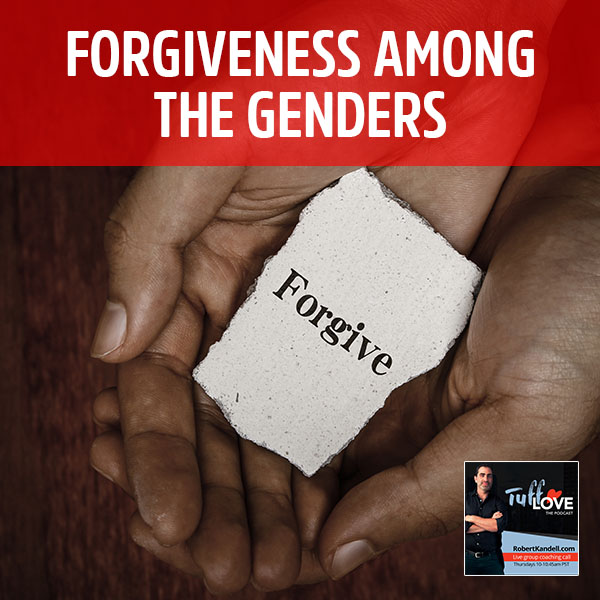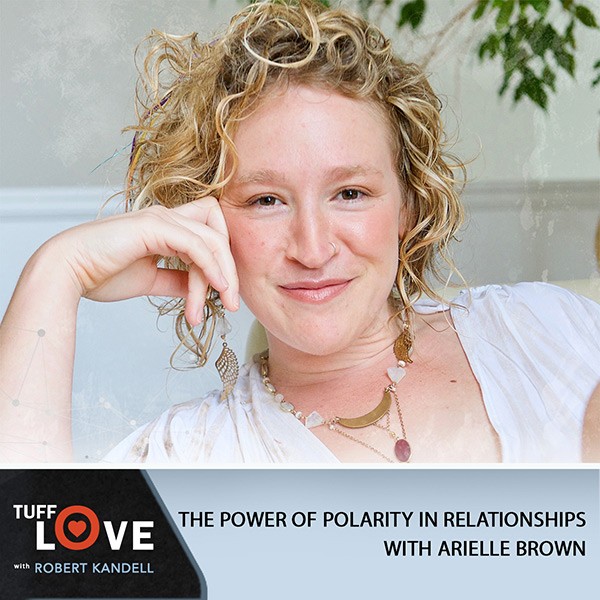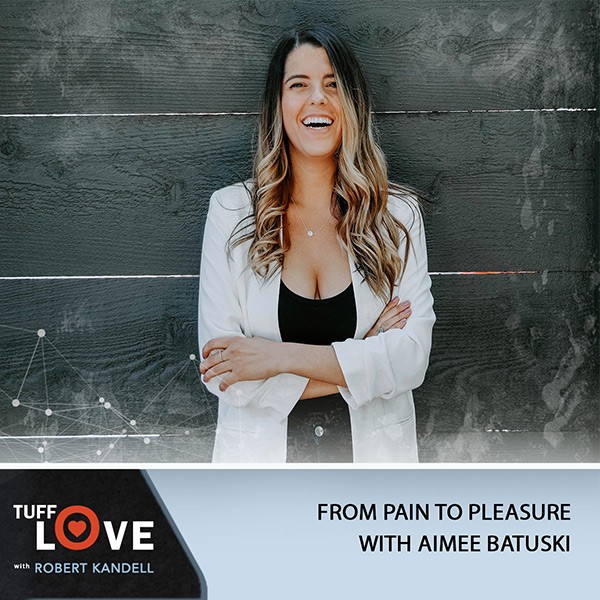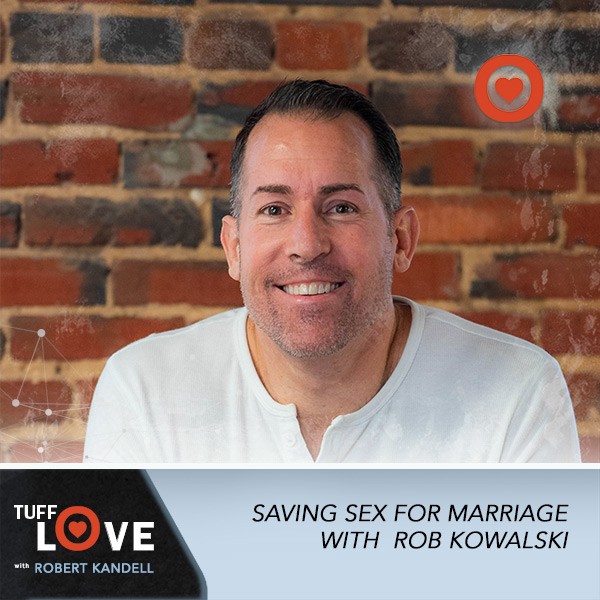
166: Forgiveness Among The Genders
Oct 31, 2018
The world is a form of transition. We live in a time of evolution and a time where things are changing dramatically and in so many different fashions. We’ve seen a significant change in the last 50 or 60 years. We’re seeing all this anger, divisiveness, and mistrust between the genders. How do we get back into the direction of equality, connection, and intimacy? How do you ask other people in your life to support you and be engaged with you in these challenging times? How do you interact with people of other genders? Even though the overall trend is heading in the wrong direction, it doesn’t mean that at the micro level, we cannot create more cohesion and more space for people to support each other. Go against the grain and reach out to your person regardless of what gender they are. Navigate around this concept of forgiveness among the genders as Rob takes on the issue with a coachee.
166: Forgiveness Among The Genders
This episode is around this concept of forgiveness among the genders. I have a coachee, friend, co-collaborator coming on. I said, “What do you want to talk about?” She talked about the concept of how men can support women and how women can support men in this changing evolutionary time, which I talk about extensively on the show. How the world is in a form of transition and how do we be of support to each other, which I thought was a great topic. Then I saw a Facebook post by a friend, a colleague of mine, a woman named Phoenix Waters and I’m going to talk about that next. That intermixed with the show.
We live in a time of evolution and we live in a time where things are changing dramatically and in so many different fashions. I’ve talked about this in the book a lot, how the patriarchy has been around for 6,000 years, 3,500 BCE or 4,000 BCE depending on the historian you’re listening to. The patriarchy has been in our psyche, in our DNA, in our way of being for over 6,000 years. In 1848, women’s suffrage movements started in the United States, the poll for women to right to vote. It wasn’t the first time where women were trying to create equality between, but it was this definitive mark of we deserve the right to vote. It took about 70 years for the 19th Amendment to occur in 1920.
It’s only been a hundred years since women in the United States have had the right to vote. What happened is in the 1960s and ‘70s, the educators in America said it’s time to create space for young girls, being women under eighteen to have more equality. They created programs for STEM, Science, Technology, Education and Math. They started changing the educational system and has had a very negative impact on boys, being male gender below eighteen. What we’ve seen is radical shifts in terms of the economy, the wage gap, men and women entering college, college degrees. We’ve seen a significant change in the last 50 or 60 years. Some statistics you can look at is the number of men entering college in the 1960s and ‘70s was around 61%. That now is completely flipped with women earning 61%, 62% of all college degrees now. It’s a reversed chart. That’s impacting choices.
Women are getting married later. People are deciding to have children or none at all later in life. We’re seeing things changing and there have been a lot of uproars. Then you throw in #MeToo and you have this explosive time and then you throw in things like Kavanaugh, which happened in the United States. We’re seeing all this anger and decisiveness and mistrust between the genders. In my opinion, we’re heading in the wrong direction. We have a president who’s making it worse. We’re heading in the wrong direction where we’re getting further apart. On some level, my scientific brain thinks that’s interesting. It could be that we need to hit bottom, we need to keep going down until we’re like, “This direction sucks. How do we get back into the direction of equality, connection and intimacy?” Perhaps we need to go down to the lower edges.
In the meantime, all you enlightened, evolved, educated people or people who are not evolved, who are reading this episode, how do you interact with people of other genders? How do you ask other people in your life to support you and be engaged with you in these challenging times? Even though the overall trend is heading in the wrong direction, it doesn’t mean at the micro, at the one-on-one level, that we cannot create more cohesion, more space for people to support each other. The concept is that you can go against the grain and reach out to your person regardless of what gender they are.
Self-esteem is built upon esteemable acts. Click To TweetI always like to say there are more than two genders in my belief system. I don’t know the exact number these days. That’s not my area of expertise. There are multiple genders. How do you reach other people and say, “How can I support you?” Connected to this is this concept of a double standard among people coming out and asking for help and revealing. I have a new friend. Her name’s Phoenix. She’s an amazing woman and coach. She’s based out in Grass Valley, California. I’m doing a little coaching with her and she said, “I have this thing that I haven’t revealed. How do I let it go?” We talked about it. Then she decided to do a Facebook Live about a time when she was nineteen, about fifteen years ago, where she raped a man.
I’m don’t know the exact details of the rape. I didn’t hear that, it’s not written. She didn’t hear his no. She didn’t have consent and pushed him into a sexual experience, I believe losing his virginity, I’m not sure, into an experience that he didn’t want. She’s been carrying around the weight of this for fifteen years. This is all public. This is the only reason I’m speaking. This is on her Facebook wall and she’s talking about it. She said on her wall, “How is it this double standard that I as a woman comes on Facebook Live and says I did this thing. The response I get from my peers is one of, ‘You’re so courageous, you’re so powerful, thank you for doing this?’” Her impression is if a man did the same thing and said, “I raped someone fifteen years ago,” he would have been slain, slammed, inflamed and torn apart. She said, “What is this double standard?”
This is what I wrote back to her on the wall. I’m not going to read them. I’m going to paraphrase it. What I said was, “My belief of a man who came on to Facebook Live and said, “I raped a woman fifteen years ago,” I would still think that person was courageous. I would think that person’s amazing and I would support him on his process of making amends to fixing his transgression from the past.” The response from other people, specifically women, probably would not be the same. I want to differentiate my response where it’s courageous for anyone who says, “I miscued in this lifetime. I’ve made a mistake. There’s something unresolved. I need to make amends.” It’s courageous to be willing to go and say, “I want to fix this.” There are other people who would have a very different response.
I want to respect and validate their experience. I suspect if a guy did that, he would get killed by women. Here’s the reason why women would do that. We’ve talked about this on the show and previous things, but I believe there’s this huge reservoir like beyond the Hoover Dam, that big reservoir. We’re talking millions and millions of gallons of repressed anger and frustration inside all the genders and especially for women. Women historically, because of our little patriarchy and all the habits, haven’t had the permission to speak their true selves because we put women in little boxes. We want these boxes to be pretty, cute, clean and manageable for people relating to women don’t have to feel uncomfortable. What women do is they squished it down.
This continues, I’m not saying this is in the past, this is still happening. What’s happening is there is more and more space. It’s like the little boxes are breaking apart and #MeToo was the definition of the box breaking apart where women are finally having a small chance to speak what’s inside. In the opportunity for this to be revealed, we’re going to deal with an extended period of time where women are going to speak about their angst, their pain, things done to them, that catcalling, the sexual abuse, the sexual harassment, the gender differences. It’s going to be an extended period of time where women come out and flail. Men have two options. Option number one is to fight back, to push back, “I’m a nice guy. It’s the other guy.” We can get back into that spot and try to push women back in the little boxes.
The second option, the one I’m choosing is to say, “Bring it on, bring all of it.” I want to do my own personal work to increase what’s called presence so I can hold all of her angst. I know that I am paying the price with Morgan of every single man that mistreated her in her entire life. I accept that and I love her so deeply and I am so invested in her being the full expression of who she is. I know sometimes when she makes a little sharp jab, I know it could be me. I also know that it could be me connected to her dad, connected to that boyfriend, connected to that man. I know it could be her entire life in that one jab. I’d rather give her the space to speak than have it fester and continue to be molded inside her system.
How do we create space to contain her for forgiveness to occur, for space, for healing? We need to each individually do our own work to own our own ship. That’s number one. Number two is that we have to increase our self-validating, self-love, self-empowering muscle to know that what we’re doing in life is right. That we are powerful human beings living the grand adventure. We’re building the bridge to nowhere. We’re improvising, we’re creating life and so we’re going to make mistakes. We’re going to step in it and on it for the rest of our lives. If you’re not stepping in it and on it, you’re not living. We have to create the ability to miscue and make these false steps and love ourselves through it.
Three, once we have these things, our self-worth and our self-validation then we need to create space for our loved ones to reveal the pain that lives inside. To me, that is the only way for us to start to create a connection. Now specifically between the genders. I spoke of how men can support women. My belief system is we need to create containers consciously, deliberately, for women to off-gas that Hoover dam full of resentment that lives inside their system from their own lives, from their mothers and grandmothers, and all the generations before that. We need to create a space for them to fully express what’s in there. We need also to keep validating people’s experiences.
I don’t know what to deal with the Ford-Kavanaugh miscue. How do we create that work? Kavanaugh could have said, “I don’t remember a damn thing of what you’re talking about.” At the same time, “That sucks and that’s a horrible experience.” How do we collaboratively create this together? How do I create a space where I’m not persecuting you for even saying this has happened? How do we create a space where we can talk about it? How would the world be different if Kavanaugh said, “I don’t know but maybe it’s possible, let’s do this together. Let’s investigate this together,” instead of the war and the gender division pain that created after that.
In terms of women supporting men, this is a little trickier and the main reason it’s tricky. Men are tricky because men are trained to have these stoic faces, no pain no gain, no retreat no surrender. We’re taught to handle our own crap. It’s the 21st century and men still are acting like John Wayne. There’s this line in this movie Predators like, “You’re shot.” It’s like, “I’ve got no time for pain.” It’s like we live in this belief system that men can’t show their emotions. For women wanting to support men in their pain, it has to be a gentle process.
For men supporting women, it’s mostly like, “I’m here, give it to me.” Women might develop trust but for men, it’s a longer process. You’ve got to de-armor that guy. You’ve got to take off his armor plate by plate, “Let me get this ratchet, I’m going to hold this little metal plate off your heart.” You have to dissolve his armor, “I’ve been doing work for 150 years at this point and I’m still armored when it comes. I still have defense systems.” When Morgan was like, “Let me hold you,” I still have that program inside of me. For women to support men, there has to be a gentle holding in the longest period of time. Know that men are going to expect your disapproval is going to come back and bite him in the ass somewhere down the line, “Honey, I want to see your soft feminine side.”
We can be the change we want to be and evolve. Click To TweetThe guys are going like you want that now but in six weeks your little brilliant mind’s going to bring that up in a fight and say like, “You cried.” All of a sudden, we don’t believe you, women. We don’t believe you because you’re so damn sneaky. I know you’re sneaky because of the whole reservoir patriarchy thing, but the point is we don’t believe. You need to take time, be patient, continue to reflect back to your guy, that you’re there, you’re interested in the long-game. You want to see all of him and then don’t use it against him somewhere down the line. A lot of guys are afraid of that. While men are a little quicker and more interactive, women, you have to take your time with us and you have to create a safe space for him to come out and de-armor. That’s the point.
The point is this is a slow process. My belief system is that this anger that exists between the genders might take a generation to heal. Satyen came on the show. He’s like, “This is going to take a generation or two. It’s going to take 50 years.” I’m hoping it won’t take that long but he might be right. At the micro level, we can start to create the change. We can be the change we want to be and evolve. We can show our children a new way of being. The little one said to Morgan, “Does Robbie always say yes to you?” Morgan says, “Yes, pretty much. I’m sure if you didn’t want to do something, he would say yes.” I do that intentionally. I show them my yes to Morgan because I want them to have the experience of a man saying yes to a woman, rather than the no that tends to live in our society. I want them to see a man saying yes to all her desires. It may be, “Yes, and we can’t do it right now,” but it’s still a yes. In the permission and in the allowing, that’s where the optimal relationships will occur.
Live Coaching
How are you?
I’m doing great. I’m happy to be here.
I’m glad to have you. Thank you for coming to the show. It’s been so long since I’ve had a coachee on the show. Thank you so much for volunteering. How can I help you? How can I be of service?
There’s a very specific topic that relates to all of this that I would like to speak to. It’s in terms of good men coming to an awareness about the actual extent that women have suffered over the #MeToo Movement. I’ll tell you the story specifically. My first boyfriend is about as typically white privileged as you can get. He’s had his own share of life stuff as anybody has. He comes from the Old South money. His mom was in a wheelchair most of his life. He has his own share of the unique things that he’s dealt with. When the #MeToo Movement happened, he was hit viscerally by it. He was so affected and he knows that I have a Master’s in Gender and Sexuality. He was emailing me and saying, “This is painful for me to realize that I am part of a gender that has inflicted this pain on women for hundreds of years.” He wanted to know what to do. By the way, he’s an adjunct professor, he’s going to get his Master’s.
He started telling me these situations where a student would say something that he found very disrespectful and how he would have a reaction where he would want to lash out or put that person down in front of the entire classroom. Considering his position of power, that’s not appropriate. He wants to do something. He wants to be active. It was interesting because I literally was talking him down. I was saying, “It’s so amazing that you want to support us. This is so incredible but attacking someone usually triggers a defense mechanism and especially if you attack someone in an inappropriate power dynamic. It’s not helping anybody.” My friend, who is a female, her response was, “Maybe within the world of men, that’s the way that men need to relate to men. Maybe he is defending women in a way that another man will understand better than you might.” What I come to is that context. It’s hard to put a single blanket statement on this. What I would be curious to know is as a man, what is your initial instinct? What is your initial reaction to protect a woman? What kind of response would be most supportive for you?

Forgiveness Among Genders: There’s this huge reservoir of repressed anger and frustration inside all the genders, especially women.
If you tell a story like that and you’re saying, “I was so eager to defend you and this is what came up,” what is it that I could say that would be encouraging but yet maybe provide some context? First of all, the patriarchal paradigm doesn’t help anyone at all. Men are suffering, the rate of suicides amongst young men is massive, there’s a lack of emotional connection. At the same time, we are set up so that when a man speaks, he tends to be heard over a woman speaking. This is another thing I definitely want to talk about. It’s like we have to do this together. Without a doubt, we cannot do it without you. At the same time, sometimes the male voice being louder, recreates the protector victim savior paradigm. What is it that would be helpful for men to hear which says, “Yes we need you to have a voice, but we need your voice to not be louder than ours. We need you to defend us in locker rooms and in this, but we don’t need you to punch someone else out because that’s not going to help the overall situation.”
It’s complicated when it comes down to it. It’s a great question. There is a lot of conflicting desires and these conflicting desires are imbued in our very chaotic society. My charge statement is that women have co-created the patriarchy. The patriarchy was not created by men alone. There were beneficial reasons at the time. There’s a book, The Better Angels of Our Nature by Steven Pinker, which is a huge amazing book. The viewpoint of the book is that the amount of violence per person has decreased significantly over time. Where if you look at now compared to when the patriarchy started, the amount of violence was no hundred thousand-fold than it is now. There was a reason we co-created the patriarchy. It was for protection, creation, flow and progress. It’s gone askew when it comes down to it.
Here we are in a different world, 6,000 years later. Moore’s Law, look at the increase of change in technology. Even a hundred years ago, if you look at the level of technology and the way of progress, it’s exponentially more. When it comes down to what to do in the present time, in this challenging time, where men are protecting women and women wanting to be protected but also not wanting to be diminished, it is time for men to do significantly more internal work to take a much deeper look inside of themselves to see their motivations.
Women want the protection of men, but they want that in union with themselves, in connection and in partnership. Click To TweetWhen we go with our habits and what we learn from our fathers and grandfathers and all those other generations, we’re missing the nuances of today’s society. Women want the protection of men, but they want that in union with themselves, in connection, in partnership. When a guy steps up and thinks, “The little lady can’t handle herself. I’ve got to fix this,” that is chauvinism. When we think, “How can I be of assistance to this powerful woman? How can we do this in collaboration?” That’s not chauvinism. To me that’s friendship, that’s intimacy. If we have our blinders on, if we haven’t done the internal work to look at the extensive amount of our chauvinism, then we act unconsciously. To your southern friend who sounds like a good guy, he sounds like a great heart, the thing I would say to him is this is your wake-up call. #MeToo woke you up. It is the drop of acid to wake you up. It is the fine high-grade coffee that will jolt your system. Take it, use it to do your investigation to see the extent of your chauvinistic patterns and programs so you can know them and have better relationships with them.
That’s a wonderful way to look at it because so much of what is read energetically comes from intention. The intention isn’t coming from a place of literally empowering the woman rather than, “She needs me to step in.” That’s read by everyone including the other men. Then it becomes a little testosterone standoff and that’s not what it’s about. What you talked about in terms of women holding space for men and how it takes time. I know this also depends on the individual. Something that I’ve thought a lot about, which I’d love for you to speak more on is the idea that women have a propensity to fill space when there is a conversation.
If we bring up something and we don’t get the same immediate response we want or it’s not expressed in the initial conversation, we’ll rush to fill it with all sorts of stuff, just a little space. I came to the conclusion that that doesn’t leave room both in terms of temporally in terms of time and in terms of emotional space, for a man to process, access and speak to what they’re feeling. What would you say is the best way for a woman to literally give a man space, so he can show up and be vulnerable or show up and be emotional? I feel like I tried different methods of that and about half of them have gone wrong.

Forgiveness Among Genders: In the permission and in the allowing, that’s where the optimal relationships will occur.
I had this with my sister because my sister is a talker. My entire life, she’s been a talker. Believe it or not in my family dynamic or when I’m off the mic, I’m a quiet person. I know it may sound strange but I am. I’m a watcher, I’m a noticer. I love to watch and notice. Morgan and I went to this thing. We love sitting around and watching people and watching interactions and talking amongst ourselves. It’s just paying attention. When a woman feels the need to fill space, more often than I believe is that she feels agitation inside of herself that she did something wrong or there’s an uncomfortable moment. If you feel the need to fix it, there’s something inside of you where you’re not in agreement with the amount of sensation in your body. When I teach people, to tell the truth, I say one is to ask permission.
Second, say the truth with his little words as possible, practice brevity, and then shut up. Stop talking. What it comes down to is like, “I don’t like the way we’re having sex and you’re going too fast and I’m not sure what this nail-biting thing is and scratching thing is but I like it. At the same time, I appreciate you who is showing up and I’m glad you shower but it’s okay. How do you think about that? I want you to know how much I love you and how much I care.” We dilute. We’re so afraid of the rawness of who we are and the truth of who we are that we add all this fluff, we had all this extra and in the extra, we lose intimacy.
Women need to learn the practice of saying nothing, knowing their right to say it and then holding the sensation of being comfortable. Men may take ten times as long for you to process it, depending on the man. Men are not taught emotional intelligence. Dealing with our emotions is not something we’re trained to do compared to women. It could take a hundred times longer for this one simple thing to filter through all our history for us to have it. Now you can also encourage a man like, “I told you a lot of truth. Go see a therapist. Go talk to your friend or go talk to this person.” You don’t have to hold it yourself. The point is if you’re trying to fill space to make it feel better, there’s some part of you that feels doubt and you’ve got to work on your own doubt first.
We're so afraid of the rawness of who we are and the truth of who we are that we add all this fluff and this extra, and we lose intimacy. Click To TweetThis is the interesting point where we have to have so much awareness of the ancestral wound and cultural conditioning and the way that we’ve been trained to be as socially acceptable men and socially acceptable women. Something I am facing quite a bit at the age of 36 is the fact that I have been trained to apologize for my wants and needs. My girlfriends and I have started a thing where every single time we hear somebody apologize for no good reason, we say, “Stop, just don’t do it.” When you look at film interpretations of women in boardrooms, I watched a movie called The Female Brain. It’s in there that to state things shortly, clearly and then leave them, it’s against the instinct that we’ve been trained into. You’re right, it absolutely dilutes the strength of our asking. It’s confusing, I’ve had boyfriends before who will be like, “You’re two paragraphs ahead. I’m back on the second sentence. Let me process what you’re giving me.”
Similarly, I had an experience where before I have a conversation with a man that’s important, I write down the number one or two most important sentences of what I’m trying to get across. I try to keep it at that and then shut up. Apologizing, making excuses for what we’re asking for. It’s a pendulum swing and that goes hand in hand with the rage. It’s like women have shame around asking for wants and needs so that goes right into the space when we try to have a discussion with men. Then I feel like men have a natural ability to be like, “She’s upset and I’m not sure why she is upset. Now I feel guilty and I don’t even know what I did.” In all reality, it’s not even necessarily a big deal. The situation becomes so charged because of hundreds of years of conditioning. What could be very simple like, “I don’t like that thing you do in bed. Can you not do it next time?” becomes this massive discussion.
We all have so much shame and doubt about who we are, which goes back to this all-important self-validating, self-loving, self-empowering muscle we need to build. I messed up all the time with Morgan, I make little mistakes and big mistakes. The only difference between me and most men is I’m like, “I make mistakes. It means I’m living. It means I’m being. It doesn’t mean I’m a bad person.” We say when we make mistakes, we’re a bad person. No, you’re a human being, being human. Admit your mistake, fix it, clean it up, make amends, sometimes it’s harder than others but go clean it up and then keep living.
What we do is we’re so afraid of being seen as a human that we hide it and then we have so much connotation around it. Like fear of being abandoned and end up dying alone underneath a bridge. The point is to build that self-love and self-empowerment. Women, build that self-love and empowerment. You don’t need a man, you want a man. You can tell him the truth rather than this weird manipulative trying to get this information across that comes out skewy and everyone gets confused and no one’s happy.

Forgiveness Among Genders: If we have our blinders on, if we haven’t done the internal work to look at the extensive amount of our chauvinism, then we act unconsciously.
It’s interesting because I think a lot about the word responsibility, how you break that down, your ability to respond which, to me, there’s so much in that. How you respond is based on reaction or non-reaction, which is based on a super complex issue like your intimate personal experience and the greater cultural paradigm and validating self-love. When I was hearing you talk, I was thinking, “It’s so true.” We all talk about this and we talk about self-love and it’s such a complex thing and I almost sometimes feel frustrated. The idea is what is the actual structure to dig into that and how can you be gentle with yourself while you’re digging into this incredibly complex thing? If I were to isolate what I think the patriarchy is, it’s a system that revolves around dominance.
You are successful when you are on top of someone else. You are successful when you are putting someone else down. In that culture, there is not a tolerance for vulnerability. I love Brené Brown’s work. There’s a lot of tolerance for vulnerability and when you are accepting failure, that requires you to be vulnerable because failures are vulnerable. I would be interested in saying, “What is your actual process in accepting failure? What has your process been in accepting failure?” Also maybe speak to the fact that if you agree with the idea that men tend to associate success with the external career validation and women tend to associate success with the external relationship validation. That’s two questions.
The way I learned to deal with failure or mistakes is I got sick and tired of the ramifications of not dealing with it well. When the pain of change is less than the pain of staying the same, we change. We put the effort into it and I got so tired. I threw myself into a difficult situation. I was the guy in a woman-run business, surrounded by women around sexuality. I threw myself into the most intense situation I could imagine in terms of learning to find myself validation as a man because I was around of a lot of powerful women who all had their agendas, and they all had their wants and weren’t the clearest communicators. I had to learn to love myself being pulled in seventeen different directions at once. There was one point I was like, “I’m spending so much time and energy beating myself up for not succeeding. Why don’t I take that energy and put it towards succeeding?”
Accepting failure requires you to be vulnerable because failures are vulnerable. Click To TweetMy analogy is if you fall out of a yoga pose you can lay on the floor and whine about falling out or you can be like, “I learned something.” I jump up, I got to get back in the pose. It was a choice. Then I saw the depths of a society of disapproval saying how we’re doing it wrong. I decided and then I built a practice around it. One of my main lines is self-esteem is built upon esteemable acts. You build your self-esteem not theoretically, you build your self-esteem by doing things that have you build esteem. You learn your integrity and you stop doing things that are not esteemable things. Classic examples for me is I go to the gym, I tell the truth to Morgan and I have integrity with my clients. I would rather lose a client than be out of integrity.
Those are certain things. Things that are out esteem is when I eat poorly, when I lie or withhold from Morgan and when I know I’m cheating. The point is I want to have a customizable program of know what you do to feel good about yourself. I know it’s annoying for people to say to love yourself but it’s the only thing to do. You have to learn to love yourself before you think you’re going to love someone else well. It is a complete falsehood that you’re going to learn to love yourself externally. It is an inside job. It means now you can use relationships to build self-love and I’m not just talking romantic relationships. You can use the power of your intimacy to build it up but it’s a practice like anything else. Do you want to learn to play the piano? Do your scales. Do you want to learn to hit the fastball? Get to the batting range. It’s very simple. It’s like we have to build a life of practice to have the life that we want.
I had a can of worms and I don’t want to open, but it was about your friend and the rape disclosure by a woman and a double standard. It might be too big of a can to open at this point.

Forgiveness Among Genders: You’re a human being. Be human. Admit your mistake, fix it, clean it up, and make amends.
Go to her wall and you can chat with her directly. She’s an amazing human being. Phoenix Waters is her name.
I’m interested in all this cultivating compassion, responsibility and ongoing dialogue and practice with each other. In talking about the Kavanaugh-Ford situation, it’s like when we fall back on self-preservation. For him, everything that might have been taught to him was, “If I admit to this, that’s it. It’s death for me, dead, gone.” Similarly, Ford had the courage to face her impending death by coming forward. You see this. I feel like as we heal these centuries of wounds, we have to constantly be able to face the death of who we knew ourselves to be to step into the future of who we could be. Having compassion for failure in those daily situations is also important for ourselves. For me, it’s like I’m so hard on myself when I feel like I do something that isn’t self-aware.
Sometimes it takes me a couple of steps back, which is why I asked you specifically about failure. Cultivating deep compassion for each other is key. If I can try to understand why you might be as a guy you have done that thing. If I can try to get into your head and maybe even understand in a way you don’t understand yet, maybe I can help deliver you the right tiny nugget of information that will make a difference in your understanding or you want to make a change.
This is how I do my coaching practice, but the main two things are I approve and I reflect. I approve of you completely as a human being, even the ugly parts, even the not so pretty parts. Even though the gooey parts. I worked very hard to approve of Morgan 100% of who she is. In that approval she shows more of herself, then I reflect. I say, “This is the impact on me. This is how it feels. This is what I see.” When you mix the two of conscious reflection with approval, you can change the world. You can change not only your own world, but you can change other people’s world because that’s unusual in today’s society. That’s my answer to that question.
Thank you so much.
Thank you so much for coming on the show. It’s been a total pleasure.
Resources mentioned:
- The Better Angels of Our Nature
- Satyen – previous episode
Podcast: Play in new window | Download







